
- •Передмова
- •Unit I ukraine, our home
- •How much do you know?
- •Ukraine
- •The national emblems of Ukraine The national emblems include the coat of arms, the flag, and the seal.
- •The ukrainian language
- •The system of schooling
- •It is never too late to learn.
- •Comprehension
- •Decide whether these statements are true (t) or false (f)
- •Unit II ukrainian way of life
- •How much do you know?
- •Traditional food
- •Sport life
- •Welcome to ukraine!
- •Ecology
- •Comprehension
- •Do you know that …
- •Unit III
- •What image of Britain do you have?
- •Great britain
- •Home, sweet home
- •British food
- •Comprehension
- •Decide whether these statements are true (t) or false (f)
- •Discussion points
- •Unit IV british world
- •Sports and games
- •E ducation What are the colleges and institutes of higher education?
- •Holidays in great britain
- •References
- •Comprehension
- •Discussion points
- •How much do you know?
- •The united states of america
- •Washington, d.C.
- •The transatlantic connection
- •Education in the usa
- •Universities and colleges
- •Comprehension
- •Discussion points
- •I. The names of some states have been scrambled up. Find the names of the states, and then write a sentence about an important industry or product of that state.
- •I9% Hispanic (also I. Look at the chart and complete the sentences.
- •III. Choose the right variant to complete the following sentences.
- •IV. Match the words in the column a with their equivalents given in the
- •2) Look at the list of values. Try to guess which value is linked to each saying.
- •The lifestyle of americans
- •Sweet home
- •Eating american style As American as apple pie
- •What’s for breakfast?
- •Fast food
- •Sports crazy
- •Time out
- •Going on vacation
- •Public holidays
- •Comprehension
- •Test yourself at home
- •I. Choose the right variant to fill the gaps in these sentences.
- •Which is better for you?
- •I II. 1) You need equipment to play most sports. Look at the list of sports and decide what equipment is needed for each sport.
- •2) There's something else that you need to play all of these sports. What is it?
- •3) What kind of sports do you play? What special equipment do you need? television in modern life
- •IV. What type of tv program are you probably watching if you see the following? Match the description on the left with the programs on the right.
- •On vacation
- •National public holidays
- •Literature
Comprehension
Answer the questions:
What influenced on the development of Ukrainian?
What are the favorite dishes of Ukrainians?
What is traditional Christmas meal of Ukrainians?
How do our people celebrate Easter?
When do we celebrate the Day of the Constitution of Ukraine?
What is a compulsory subject at all schools?
Who is the “World’s Best Athlete”?
What attracts tourists to Ukraine?
What is a problem of the heavily industrialized cities?
What are the most polluted rivers of Ukraine?
Do you know that …
… in 1976 the Olympic fire was transferred to Montreal via the earth satellite.
… boxing was officially banned in Sweden.
… Pythagoras was an Olympic champion in boxing.
… the first man who lifted the weight exceeding 200 kg was Yurii Vlasov.
… Ukrainian sportsmen won 10 gold medals at the 15th Olympics.
Substitute the underlined pronouns.

Easter eggs Contamination Holubtsi nation “Dynamo”
They are filled with buckwheat or millet grits, rice or meat.
Children enjoy painting them and eating Easter bread.
It was the European Cup Holder twice in 1975 and 1985.
Ukrainians are a hospitable one.
It has affected the air, land and water of Ukraine.
Decide whether these statements are TRUE (T) or FALSE (F)
Borsch is made of vegetables, fruit, meat or fish.
Women’s Day is the day to show love and respect to women of all ages.
At the Olympic games in Seul Ukrainian skater Yana Klochkova won the first gold medal for independent Ukraine.
Much chemical fertilizer is washed into the river.
The Crimea is the best place to rest and to enjoy yourself the year round.
Search
Find more facts about:
the most commonly eaten dishes in your region
traditions of your region
achievement of Ukrainian sportsmen in Olympic games
development of tourism in the Crimea
the ecological situation of Ukraine and your region
and make a report.

Unit III
ACROSS GREAT BRITAIN
Britain has no constant enemies,
Britain has no constant friends,
Britain has only its own interests.
Winston Churchill
How much do you know?
What image of Britain do you have?
Which places of Britain would you like to visit? What are your reasons? How do you think you can explore these areas and broaden your knowledge of Britain?
What is the difference between British English and American English?
What styles of speech in English do you know?
Our home is a place which we feel comfortable and at ease. Do you agree? What do you know about the attitude of English people to their homes?
What are the peculiarities of British food? Can you name any typically British dishes?
Great britain
G reat
Britain is an island lying off the north-western coastline of Europe.
The English Channel separates it from the mainland in the south. The
Strait of Dover, 18 miles wide, divides it from France. Great Britain
is separated from Belgium and Holland by the North Sea, and from
Ireland by the Irish Sea.
reat
Britain is an island lying off the north-western coastline of Europe.
The English Channel separates it from the mainland in the south. The
Strait of Dover, 18 miles wide, divides it from France. Great Britain
is separated from Belgium and Holland by the North Sea, and from
Ireland by the Irish Sea.
The official name of Great Britain is the United Kingdom of Great Britain and-Northern Ireland. Great Britain is the name of the major island of the United Kingdom including England, Scotland and Wales; the United Kingdom, or the UK comprises Great Britain and Northern Ireland.
T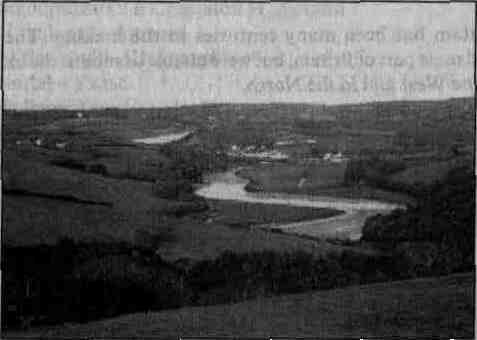 he
UK is often referred to as Great Britain or the British Isles. It is
an island state consisting of more than 5000 large and small islands,
the most important being the Isle of Man and the Isle of Wight.
England is a part of the island of Great Britain.
he
UK is often referred to as Great Britain or the British Isles. It is
an island state consisting of more than 5000 large and small islands,
the most important being the Isle of Man and the Isle of Wight.
England is a part of the island of Great Britain.
Geographically the island of Great Britain is subdivided into two main regions: Lowland Britain and Highland Britain. The highest mountain Ben Nevis (1343) is in Scotland; the highest peak in Wales is Snowdon (1085).
The greater part of the land is flat. There are plenty of short rivers in Great Britain; the Severn is the longest one, while the Thames is the deepest and the most important one.
There is much rain and fog in England. October is usually the wettest month, July is the hottest and January is the coldest one. All over the world Britain is notorious for its fog. English people used to call it smog. An unusually thick smog in London in 1962 caused the death of some 4,000 people. The flora of the British Isles is varied and the fauna is similar to that of the north-west of Europe.
The country is not very rich in mineral resources. Over three-quarters of Britain's land is used for farming; farms produce nearly half of the food that Britain needs. The UK is a highly developed industrial country too, known as a producer and exporter of machinery, electronics, ships, aircraft and navigation equipment.
The capital of the UK is London, in England. The capital of Wales is Cardiff, and the Scottish capital is at Edinburgh; the capital of Northern Ireland is Belfast.
G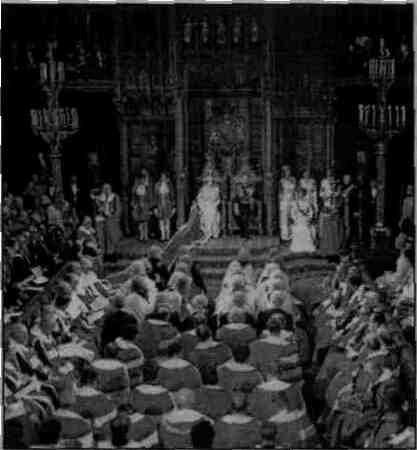 reat
Britain is a monarchy, but the powers of the
Queen
are limited by the Parliament, which consists of two Chambers, the
House of Lords and the House of Commons. In theory, the constitution
has three branches:
reat
Britain is a monarchy, but the powers of the
Queen
are limited by the Parliament, which consists of two Chambers, the
House of Lords and the House of Commons. In theory, the constitution
has three branches:
1. Parliament, which makes laws.
2. Government, which puts the laws into effect.
3. Law courts, which interpret the laws. Although the Queen is officially head of all three branches, she has little direct power.
Parliament has two parts: the House of Lords and the House of Commons. Members of the House of Commons are elected by the voters of 650 constituencies. They are known as MPs or Members of Parliament. The Prime Minister, or leader of the Government, is also a MP, usually the leader of the political party with the majority in the House of Commons.
The Prime Minister is advised by a Cabinet of about twenty other ministers. The Cabinet includes the ministers in charge of major government departments or ministries. Departments and ministries are run by civil servants, who are permanent officials. Even if the Government changes after an election, the same civil servants are employed.
M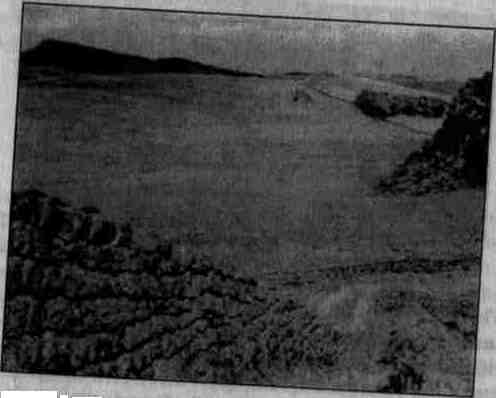 embers
of the House of Lords (peers) are not elected. About 70 per cent of
them are «hereditary peers» because their fathers were peers before
them. The other 30 per cent are «life peers», whose titles are not
passed on to their children. They are officially appointed by the
Queen, on the advice of the government, for various services to the
nation.
embers
of the House of Lords (peers) are not elected. About 70 per cent of
them are «hereditary peers» because their fathers were peers before
them. The other 30 per cent are «life peers», whose titles are not
passed on to their children. They are officially appointed by the
Queen, on the advice of the government, for various services to the
nation.
Britain has been many centuries in the making. The Romans conquered most part of Britain, but were unable to subdue the independent tribes in the West and in the North.
Hadrian's wall, the greatest monument of the Roman occupation of Britain, was built to act as a defence against the Celts from Scotland
Further waves of invaders followed: Angles, Saxons, Jutes, Vikings and Normans. All these contributed to the mixture we call the English. For many centuries this country was known simply as England.
It had a strong army and Navy. It waged numerous colonial wars. England, once «the workshop of the world», was the first to become a highly developed industrial country.
LONDON
L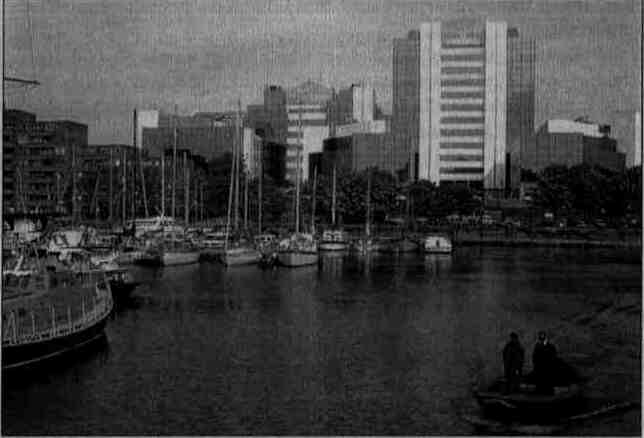 ondon
is the capital city of England and of the United Kingdom situated on
the Thames river, the largest city in Britain and one of the largest
cities in the world.
ondon
is the capital city of England and of the United Kingdom situated on
the Thames river, the largest city in Britain and one of the largest
cities in the world.
London manages in a unique way to reflect the past and, at the same time, to live a life of a modern city. There is always something new to be discovered, some fresh approach to a familiar scene, some curious piece of life in the city where the old and the new exist side by side in mutual tolerance and respect.
One of the best ways to acquaint yourself with the city when you first arrive is to take a sightseeing tour on a double-decker bus. Join London Transport's Original Sightseeing Tour in Victoria Street, near Victoria Station, for your introduction to the capital.
The first famous sight to look out for is the Greek-Corinthian Constitution Arch at Hyde Park Corner. The bus runs along the eastern side of the park to Marble Arch, designed by John Nash in the style of a Roman triumphal arch.
D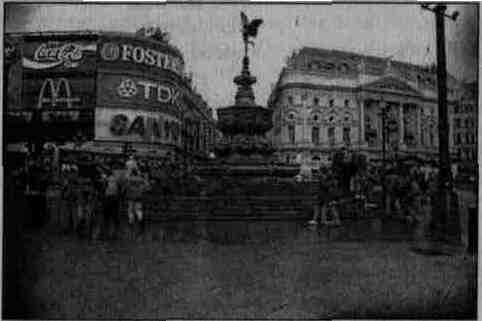 own
through elegant Mayfair with its prestigious squares, you come to
Regent Street and the statue of Eros at Piccadilly Circus.
own
through elegant Mayfair with its prestigious squares, you come to
Regent Street and the statue of Eros at Piccadilly Circus.
Bustling Trafalgar Square is dominated by the imposing Nelson's Column, built in honour of Britain's naval hero Admiral Lord Nelson.
Whitehall, location for Horse Guards Parade and Downing Street,
Piccadilly Circus is known for the statue of official home of Prime ministers since
Eros and brightly lit advertisements at night 1731, leads to Parliament Square. The
stately Houses of Parliament, originally a royal palace, house the Big Ben clock - still wound by hand and an authoritative time-kеерег. Historic Westminster Abbey is where English sovereigns have been crowned and buried for over 900 years.
The bus takes you across Lambeth Bridge, past Lambeth Palace -the Archbishop of Canterbury's residence - and along the South Bank to the Royal Festival Hall. Crossing Waterloo Bridge, you head via Fleet Street to St. Paul's Cathedral, masterpiece of 17th-century architect, Sir Christopher Wren, and chosen by Prince Charles and Lady Diana Spencer for their wedding in 1981.
In the heart of the City of London, founded by the Romans in 43 AD you will see Mansion House, the Lord Mayor's home; the Bank of England, centre of the nation's finances; and towering above everything else, the striking Lloyds of London building.
The tour now crosses two of London's most famous bridges, the modern London Bridge and the majestic Tower Bridge, the 19th-century drawbridge. The mighty Tower of London, dating back to the 11lh century, has served as palace, prison, Royal Treasury and Mint, and has a colourful history.
There are two main districts of London - the West End and the East End. These are not merely geographical names. The West End consists of the fashionable houses of the rich, art galleries, famous museums, theatres, palaces and parks. The East End is still a poorer district full of factories and plants, it is a district were poorer people live too, though it can no longer be called a district of the poor as housing conditions have improved.
Piccadilly is a fashionable shopping center. Its famous fountain with a statue of Eros, the Greek god of love, attracts crowds of tourists.
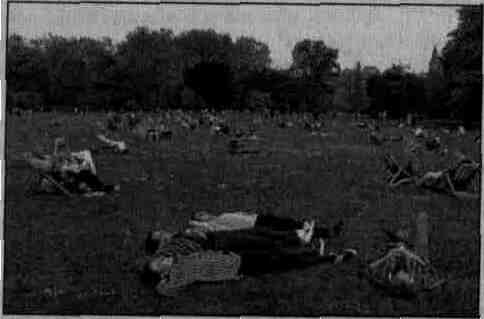 There
are many public parks in London: Hyde Park, Regent Park, Kengsington
Gardens, to name only a few. Hyde Park is Londoners' favourite
resting place, where crowds of people may be seen in the «Speaker's
Corner» listening to Hyde Park speakers. During the day a lot of
people sit on green grass lawns eating sandwiches, drinking beer or
soft drinks and talking and having rest, some in the shade, some in
the sunshine. Not only in Hyde Park, all along the Thames side
gardens peoples are resting, taking their midday «breath of air».
Everything is still and peaceful around. You could hardly imagine
that an enormous city with its traffic and noise is but a few paces
away.
There
are many public parks in London: Hyde Park, Regent Park, Kengsington
Gardens, to name only a few. Hyde Park is Londoners' favourite
resting place, where crowds of people may be seen in the «Speaker's
Corner» listening to Hyde Park speakers. During the day a lot of
people sit on green grass lawns eating sandwiches, drinking beer or
soft drinks and talking and having rest, some in the shade, some in
the sunshine. Not only in Hyde Park, all along the Thames side
gardens peoples are resting, taking their midday «breath of air».
Everything is still and peaceful around. You could hardly imagine
that an enormous city with its traffic and noise is but a few paces
away.
References
Hyde Park Corner – перехрестя, яке примикає до Гайд парку з південно-східної частини, відоме напруженим рухом.
Marble Arch – тріумфальна арка (яку построїли в 1828 році, як вхід до Букінгемського палацу; виявилася дуже вузькою для королівської процесії та була перенесена в 1851 році на своє сучасне місце, у північно-східній частині Гайд парку)
Mayfair – Мейфер (модний та дорогий район Вест Енду у Лондоні між Оксфорд Стріт, Ріджент Стріт, Піккаділлі та Парк Лєйн; відомий дорогими готелями, ресторанами та магазинами)
Piccadilly Circus – Піккаділлі (площа у центральному Лондоні, перехрестя Піккаділлі Стріт, Ріджент Стріт та Шафтсбери Авеню; відома яскравою рекламою)
Horse Guards Parade – місцевість для проведення параду кінної гвардії під час святкування дня народження Королеви; знаходиться на Уайтхоллі
The Archbishop of Canterburry – архієпископ Кентерберрійський (церковний титул глави Церкви Англії, котрий являється одночасно єпископом Кентерберри)
The City of London - лондонський Сіті (адміністративний район у центрі Лондону, історичний центр міста; займає площу приблизно в одну квадратну милю та являється центром фінансів та комерції, звідси його назва «London's square mile of money»; у ньому знаходяться банк Англії, фондова біржа та офіси багатьох фінансових компаній; перен. фінанси)
Kensington – фешенебельний район у центральному Лондоні, там знаходяться дорогі магазини, посольства та дома багатих лондонців.
Lloyds of London – лондонський офіс найбільшої страхової компанії у Великобританії.
Lord Mayor – лорд-мер, титул голови муніципалітету, великих міст Англії.
Royal Mint – Королівський монетний двір.
STANDARD ENGLISH AND REGIONAL ACCENTS
R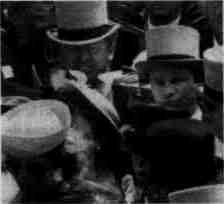 eceived
Pronunciation (RP):
the form of British English pronunciation which is used by many
educated people in every part of Britain and is typical of many
people in the south of England. It is thought of as a standard form
and is often used by the ВВС. It is also used in teaching English
in many parts of the world.
eceived
Pronunciation (RP):
the form of British English pronunciation which is used by many
educated people in every part of Britain and is typical of many
people in the south of England. It is thought of as a standard form
and is often used by the ВВС. It is also used in teaching English
in many parts of the world.
Received Pronunciation (RP) or ВВС English (so called because it is used by ВВС announcers) is the accent of the South-east of England. It has been associated with power and high social class since the 14th century.
Accent is the sound of a person's pronunciation of the English language. It is very important in Britain. It shows where a person comes from and, to an extent, what class he or she belongs to. Britain has many different accents. Each of the four countries in the Kingdom, England, Scotland, Wales and Ireland, has its own accent. Within England most of the counties have a different accent. The sound of someone’s voice will often show the position people hold in society. Today society has changed and regional accents are more acceptable. But an RP accent is still important and will help people to get jobs and a position in society, which might be denied, to them if they spoke in a different way.
Cockney is a way of speaking English that is typical of people who live in the eastern area of London. It is known as the London dialect. Cockney means East End working class.
What does Cockney sound like?
"That ain 't got nothing to do with it "(Cockney) = "That has nothing to do with it. "(Standard English)
Th are pronounced like f as in barf for "bath", or v, as in bruvver for "brother". They neglect the t in words like "butter", "bottle", "rotten", which in Cockney can best be represented by bu! er bo! le, ro! en. Similarly, didn't becomes didn and haven't turns into arn.
The characteristic for which Cockney is famous, of course, is the silent h. "That's an edgeog" means "That's a hedgehog". The g is often missing from -ing endings like: eatin 'and drinkin'. Cockney will drop letters and slur words in many different ways. Old becomes ol. An becomes ern, as in ern afternoon. You is yer, and so on.
Rhyming Slang is a way of speaking, originally popular among cockneys, in which a rhyming phrase, or part of it, is substituted for a standard word.
This form of slang replaces a word with a phrase which rhymes with it:
'loaf of bread' ('loaf) means 'head';
'apples and pears' ('apples') means 'stairs';
'bees and honey' means 'money.
